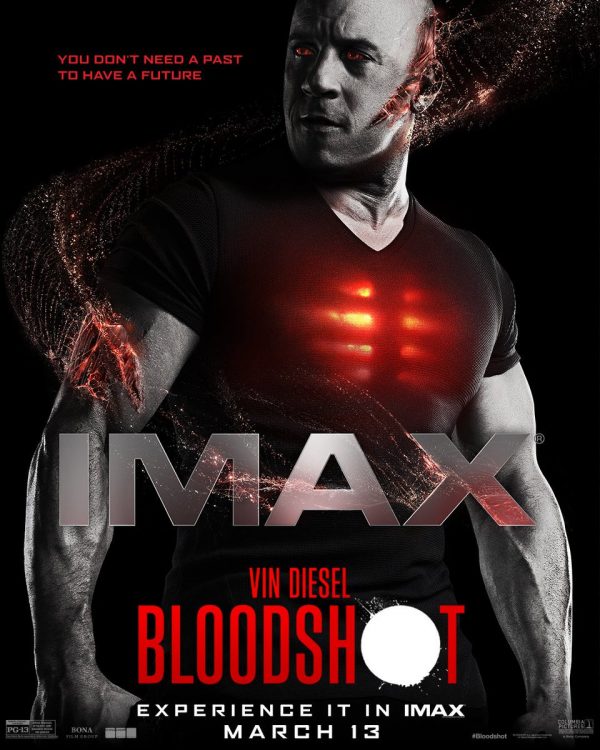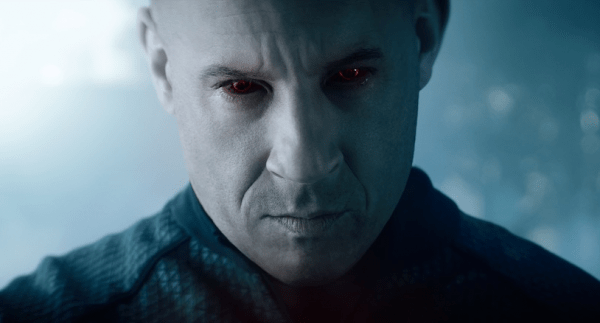Bloodshot, 2020.
Directed by Dave Wilson.
Starring Vin Diesel, Eiza González, Jóhannes Haukur Jóhannesson, Guy Pearce, Toby Kebbell, Sam Heughan, Talulah Riley, Alex Hernandez, Siddharth Dhananjay, and Lamorne Morris.
SYNOPSIS:
Ray Garrison, a slain soldier, is re-animated with superpowers.
If it were a better movie, Bloodshot would have taken the inherent blandness of its globetrotting vengeance tale, turning those tropes on their head for a more refreshing action experience. To his credit, director Dave Wilson (collaborating with Fantasy Island screenwriter Jeff Wadlow and Arrival screenwriter Eric Heisserer) attempts to do this very thing, allowing Vin Diesel’s resurrected soldier Ray Garrison (who will be known simply as Bloodshot from here on out since that’s the only label given to him in the cast, and because there’s not much to the character anyway other than stale superpowers and the usual cringe-inducing emoting from the physically intimidating presence) to enact his revenge at the end of the first act.
Soon after, it is revealed that Bloodshot is being manipulated for more nefarious purposes. More intriguingly, this state-of-the-art government technology is not only used to revive him after a mission gone wrong but also has the ability to alter his memories however the scientists and coders see fit. Consider it Photoshop for reshaping whatever is inside the brain; a computer program with infinitely more intriguing possibilities than a blood transfusion replacing the bloodstream with tiny looking insects capable of repairing tissue damage and more whenever Bloodshot sustains damage (I would love to tell you what happens if a shotgun or grenade happens to tear his body into pieces, but the PG-13 rating restricts such things and in some ways renders the Valient comics adaptation largely pointless). This is a movie that clearly has an R-rated cut out there (get ready for the unrated cut with CGI blood), as one extended shootout is drenched in red lighting to supposedly mask the fact that heavy firepower and explosions are doing nothing to these characters but hurting them. Yes, it’s as silly as it sounds.
These are the kernels of ideas trying to separate Bloodshot apart from the standard story of an invincible man with regenerative powers going on a revenge-fueled killing spree, but Dave Wilson manages to never fully dive into any of those concepts, all while somehow indulging in incoherent quick-cutting action that abuses slow-motion and lacks impact. Again, Bloodshot is a comic book movie about someone that can instantly heal any wound (even as he is repeatedly shot in the head), choosing not to take advantage of blood or gore to express a sense of the character’s true power and resiliency. This is not a cry for more violence (there’s already enough of that in the world), but if you’re going to make a movie about someone where the selling factor is the protagonist being indestructible, it would be a wise idea to absolutely destroy that character in brutal ways subsequently rebuilding him on the spot.
There’s also not much here to make up for Bloodshot utterly failing at its admittedly cool premise. Vin Diesel has a smoking hot model girlfriend (Talulah Riley) who he reassures to he will come home from field operatives every single time. He fails that girl, and it doesn’t matter whether he makes things right or not because there’s also another supporting female character (Eiza González) a part of the same secret squad of augmented soldiers to serve as another love interest. Ironically, her lone hand-to-hand combat sequence is better choreographed and shot than anything Bloodshot does, and he chokeslams a henchman through a toilet at one point. Not even that comes across as a moment worth cheering on despite how ridiculously absurd that sounds.
Nevertheless, the squad happens to be made up of a mad scientist of sorts heading the whole team (Guy Pearce) who has found various ways to rescue wounded soldiers and refit them for both battle and his own malicious plans (it has something to do with changing the face of war and getting rich off the profits, which is yet another generic motivator for the film’s characters). The other team members are interchangeable and unmemorable aside from their injury (one of them has a series of cameras installed onto his body to replace his eyes, another has exoskeleton legs, and so on and so forth), but even during the climactic action sequence all of the characters just blend together as one boring entity. It doesn’t help that they all start putting on full-body exoskeleton suits that make them resemble some kind of awful rejected Dr. Octopus concept. Bloodshot also befriends a coder (Lamorne Morris) who does nothing but cracks jokes no one is around to hear or finds funny, and that includes the audience. It’s a poor attempt at comedic relief that’s as disappointing and baffling as everything else here.
The kicker is that the longer Bloodshot goes on, it tends to find ways to avoid showing the titular superhero fighting bad guys or taking damage (one sequence is seen almost entirely from the perspective of cameras meant to spy on him and his Nanite levels, which here is video games speak for health that when empty temporarily ceases regeneration). Meanwhile, the final sequence is a colossal mess inside of a skyline elevator that’s disorienting and simply not entertaining; it’s more like a really bad final boss fight. Fittingly, Bloodshot feels more like a bad adaptation of a possibly good video game than a worthwhile treatment to the comic book source material.
Flickering Myth Rating – Film: ★ ★ / Movie: ★ ★
Robert Kojder is a member of the Chicago Film Critics Association and the Flickering Myth Reviews Editor. Check here for new reviews, friend me on Facebook, follow my Twitter or Letterboxd, check out my personal non-Flickering Myth affiliated Patreon, or email me at MetalGearSolid719@gmail.com














